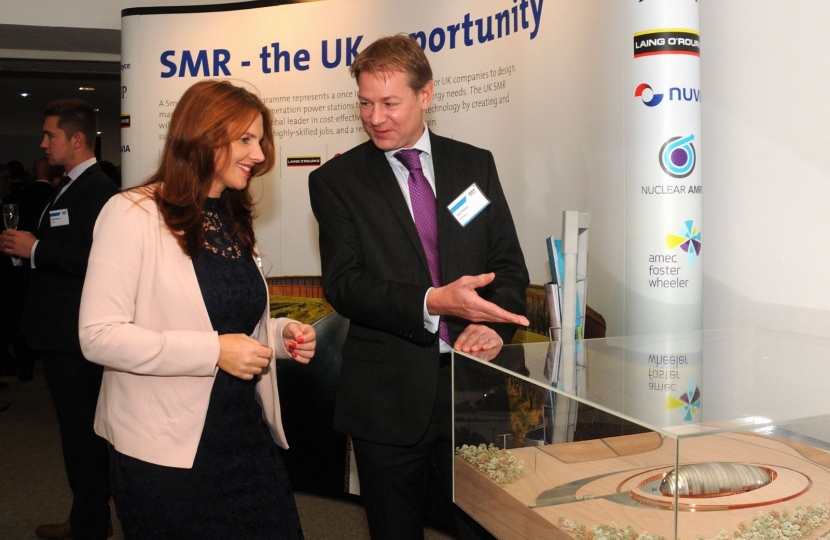
‘The Future is nuclear and it’s a bright one’ says Trudy Harrison MP on the release of the Government’s Energy White Paper.
Today the Government has published its Energy White Paper setting out ambitious plans to clean up the country’s energy system, support up to 220,000 British jobs, and keep bills affordable, all part of the transition to net zero by 2050.
The paper builds on the Prime Minister's Ten Point Plan for a Green Industrial Revolution, and details the specific steps the Government will take over the next decade to cut emissions from industry, transport, and buildings by 230 million metric tonnes - equivalent to taking 7.5 million petrol cars off the road permanently - while supporting many thousands of new green jobs.
In the paper, the Government pledges to continue to engage with developers in the UK's new nuclear market as well as creating a £385 million Advanced Nuclear Fund to support the development of Small Modular Reactors and to support research and development into more advanced nuclear technologies, such as advanced modular reactors.
Trudy, Co-chair of the Nuclear Delivery Group and APPG for Nuclear Energy, said: “The Energy White Paper sets an ambitious direction today for a revolution, with a massive focus on nuclear power. And, for us in Cumbria, this is brilliant because it's what provides thousands of highly skilled jobs in our area.
“Since the 1940s Copeland has led the way and if I have my way, we'll be leading this renaissance once again, with a Rolls-Royce 440mw reactor on or adjacent to the Sellafield site on NDA owned land. But we will also focus on the research and development of the next generation of advanced reactors with the National Nuclear Laboratory, and we'll enjoy the spin off industries like robotics and remotely operated vehicles in existing and new companies in our towns like Cleator Moor and Egremont.
“It was also brilliant to hear so many of my Parliamentary colleagues speaking up for nuclear, cross party, from across the UK and for many different but equally good reasons. The future is nuclear and it's a bright one.”
Overview of Key Commitments
The Energy White Paper sets out the Government's policies and commitments to power our transition to net zero by 2050. Key elements include:
1. Supporting up to 220,000 jobs in the next 10 years. This includes long-term
jobs in major infrastructure projects for power generation, carbon capture
storage and hydrogen, as well as a major programme of retrofitting homes for
improved energy efficiency and clean heat.
2. Transforming the UK's energy system from one that was historically based
on fossil fuels to one that is fit for a Net Zero economy, changing how we heat
our homes and travel, doubling our electricity use, and harnessing renewable
energy supplies.
3. Keeping bills affordable for consumers by making the energy retail market
truly competitive. This will include offering people a simple method of switching
to a cheaper energy tariff and testing automatically switching consumers to
fairer deals to tackle "loyalty penalties”.
4. Generating emission-free electricity by 2050 with a trajectory that will see us
have an overwhelmingly decarbonised power in the 2030s. Low carbon electricity
will be a key enabler of our transition to a Net Zero economy with demand
expected to double due to transport and low carbon heat.
5. Establishing a UK Emissions Trading Scheme (UK ETS) from January 1st
2021 to replace the current EU ETS at the end of the Transition Period. lt
increases ambition on reducing emissions, and provides continuation of
emissions trading for UK businesses and certainty on how they operate.
6. Continuing to explore a range of financing options for new nuclear with
developers including the Regulated Asset Base (RAB) funding model, which
could help secure private investment and cost consumers less in the long run.
Given the scale of the financing challenge, we will also consider the potential
role of government finance during construction, provided there is clear value for
money for consumers and taxpayers.
7. Delivering ambitious electricity commitments through our world-beating
commitment to deliver 40GW of offshore wind by 2030, including 1GW of
floating wind, enough to power every home in the country, while attracting new
offshore wind manufacturers to the UK.
8. lnvesting £1 billion in state-of-the-art carbon capture storage in four
industrial clusters by 2030, sucking carbon out of industrial processes to stop
emissions escaping to the air. Four low carbon clusters will be set up by 2030,
and at least one fully net zero cluster by 2040, stimulating the market to attract
new investors and manufacturers to reinvigorate our industrial heartlands.
9. Kick-starting the hydrogen economy by working with industry to aim for SGW
of production by 2030, backed up by a new t240m Net Zero Hydrogen Fund
for low carbon hydrogen production.
10. lnvesting £1.3 billion to accelerate the rollout of charge points for electric
vehicles in homes, streets and on motorways as well as up to £1 billion to
support the electrification of cars, including for the mass-production of the
batteries needed for electric vehicles. The rollout has levelling up at its heart,
and will support economic growth across the UK, including in our strong
manufacturing bases in the Midlands and the North East, while supporting the
169,000 jobs in our world-leading automotive sector.
11. Supporting the lowest paid with their bills through a £6.7 billion package of
measures that could save families in old inefficient homes up to f400. This
includes extending the Warm Home Discount Scheme to 2026 to cover an extra
three quarters of a million households and giving eligible households f 150 off
their electricity bills each winter. The f2 billion Green Homes Grant announced
by the Chancellor has been extended for a further year in the Ten Point Plan.
12. Moving away from fossil fuel boilers, helping to make people's homes
warmer, whilst keeping bills low. By the mid-2030s we expect all newly installed
heating systems to be low carbon or to be appliances that we are confident can
be converted to a clean fuel supply.
13. Supporting North Sea oil and gas transition for the people and communities
most affected by the move away from oil and gas production, ensuring that the
expertise of the oil and gas sector be drawn on in developing carbon capture
and storage and hydrogen production to provide new green jobs.
13. Supporting North Sea oil and gas transition for the people and communities
most affected by the move away from oil and gas production, ensuring that the
expertise of the oil and gas sector be drawn on in developing carbon capture
and storage and hydrogen production to provide new green jobs.


